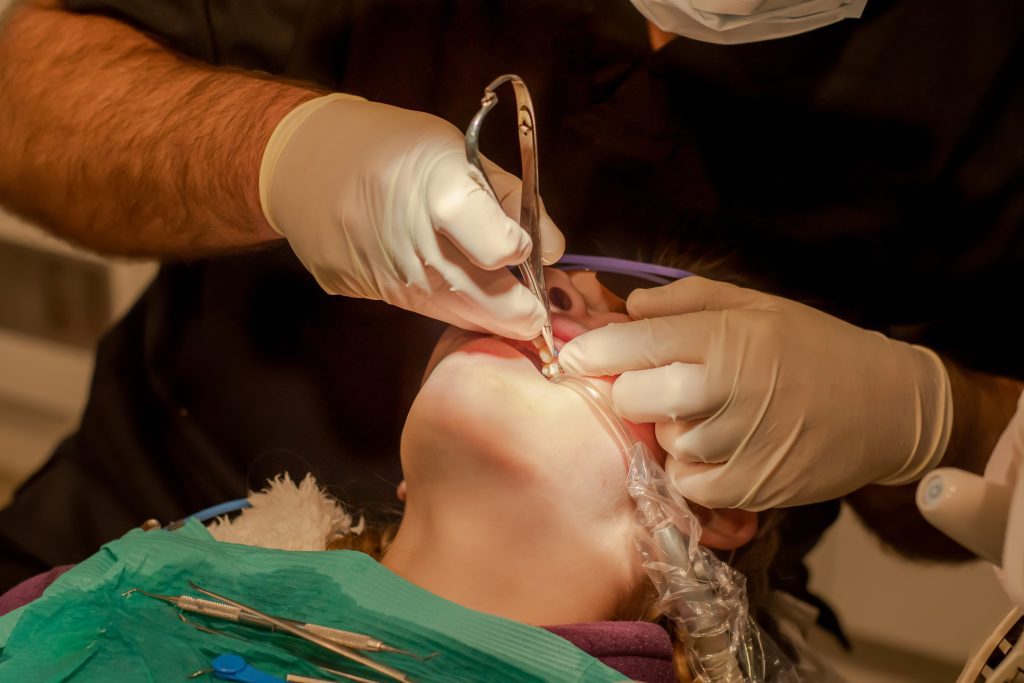It’s not uncommon to leave the dentist’s office with some discomfort, but when that discomfort turns into a pounding headache or sore jaw, it can be both alarming and frustrating. Whether you’re recovering from a tooth extraction, filling, or wisdom teeth removal, understanding why you’re dealing with tooth pain and headache can help you manage it more effectively. At Enamel Dental in Penticton, we believe recovery shouldn’t be a mystery. Let’s break down the most common causes and relief strategies for jaw pain, headaches, and everything in between.
Why You Might Have a Headache After Dental Work
Dental procedures, no matter how routine, can sometimes trigger unintended side effects. One of the most frequently reported is a headache after dental work. While some discomfort is expected after fillings, extractions, or other treatments, lingering head or jaw pain isn’t something you should ignore. There are several reasons why this might occur:
Jaw tension and muscle strain – Long dental appointments can leave your mouth open for extended periods, which places a significant amount of strain on the jaw muscles. This often leads to jaw pain and headache after dental work, especially around the TMJ (temporomandibular joint). The muscle fatigue can radiate into your temples, causing dull or throbbing headaches that may last for hours.
Nerve sensitivity – Your face and mouth are home to a dense network of nerves, and even minimal dental manipulation can sometimes irritate them. This can result in a tooth pain headache that spreads beyond the treated area, often presenting as pressure behind the eyes, along the jawline, or even into the neck.
Stress and anxiety – Dental visits can be nerve-wracking for some people. Whether you’re aware of it or not, clenching your jaw during the procedure is a common response to stress. This tension often continues after the appointment, leading to tension-type headaches that may feel like a tight band around your head.
Reaction to anesthesia or medication – In rare cases, a headache after dental work may be caused by the anesthetic or pain medication itself. While these reactions are typically mild, they can contribute to fatigue, light sensitivity, or nausea alongside the headache.
In some cases, a chronic headache after dental work may indicate an underlying issue such as bite misalignment, infection, or an improperly placed filling or crown. If your discomfort persists more than a few days, it’s time to speak with your dentist. Contact Enamel Dental today to book an appointment and get the relief you need.
Tooth Pain and Headaches: What’s the Connection?

The connection between tooth pain and headache is more common than you might think. When your teeth hurt, the pain doesn’t always stay in one spot. Because the trigeminal nerve connects your jaw, teeth, and head, discomfort in one area can easily spread to another. A cavity headache, for example, can feel like sinus pressure or a dull ache behind your eyes. Similarly, a tooth infection headache can produce throbbing pain across your cheek, jaw, or temple. These issues may stem from:
- Deep cavities or untreated decay
- Abscesses or infections in the tooth root
- Grinding or clenching (bruxism)
- Misalignment or bite issues
If you’re dealing with repeated tooth pain and headache, it’s worth investigating whether the two are related. At Enamel Dental, we can help pinpoint the cause and prevent the problem from recurring.
Jaw Pain and Sore Jaw After Fillings or Extractions
Getting a filling might seem like a quick fix, but even small procedures can lead to jaw pain after dental work. Here’s why:
- Prolonged mouth opening can leave your jaw sore after a filling.
- Overworking the TMJ can cause jaw hurts after filling symptoms that last for a few hours, or even days.
- Misaligned fillings or changes in bite pressure can result in teeth pain that spreads to your ear or head.
Extractions, especially difficult ones, can leave you with a sore jaw after dental work, particularly if the tooth was impacted or required extra manipulation. To avoid worsening the issue, avoid chewing tough foods, apply a cold compress, and follow your dentist’s aftercare instructions closely.
Wisdom Teeth Removal and Headaches: What to Expect
Experiencing a headache after wisdom teeth removal is incredibly common, especially in the first 48–72 hours post-op. The reasons for a wisdom teeth headache include:
- Swelling and inflammation near the extraction site
- Tight jaw muscles from prolonged opening or clenching during surgery
- Changes in bite pressure as your mouth adjusts to the missing teeth
- Dry socket (when the protective blood clot dislodges), which can cause intense, radiating pain
If you’re experiencing a headache after tooth extraction in your wisdom teeth area, rest assured it usually subsides with proper recovery. However, if the pain worsens or spreads, reach out to your dental team immediately, especially if accompanied by a fever or foul taste in your mouth.
How to Relieve Headaches and Jaw Pain After Dental Procedures

Managing tooth pain and headache after a dental appointment doesn’t always require a return visit. In many cases, you can reduce your discomfort at home with a few practical strategies:
Apply Cold or Warm Compresses
Use a cold compress for swelling and jaw pain, Use a warm compress for muscle relaxation
Stick to Soft Foods
Avoid chewy, sticky, or crunchy items that may aggravate your healing jaw.
Take Anti-Inflammatory Medications
Over-the-counter options like ibuprofen can reduce swelling and ease both tooth pain and headache.
Rest and Hydrate
Dehydration and stress can amplify pain. Stay hydrated and get plenty of rest.
Practice Jaw Stretches or Massage
Gentle stretching can relieve tension in your TMJ. Your dentist can show you how.
Return for a Bite Adjustment if Needed
Sometimes, new fillings can slightly alter your bite. If your teeth feel uneven when chewing, you may be unintentionally clenching. This can lead to tooth pain and headache. A quick adjustment can solve the issue. If you’re experiencing persistent jaw pain after filling or a chronic headache after dental work, don’t try to tough it out. These may be signs of underlying dental problems that require professional care.
When to Call the Dentist
Mild discomfort is expected, but ongoing tooth pain and headache should not be ignored. Contact Enamel Dental if you notice:
- Sharp, prolonged pain that doesn’t improve
- Swelling, pus, or signs of infection
- A headache after tooth extraction that worsens after 3-4 days
- Jaw clicking or locking
- Pain when biting or chewing after a filling
Our team is here to support you through every stage of treatment, from routine fillings to full smile transformations.
Final Thoughts: You Don’t Have to Live With Dental Pain
While tooth pain and headache after dental work is common, it doesn’t have to be your normal. From post-filling jaw tension to complications after wisdom tooth surgery, most discomfort is temporary and treatable. At Enamel Dental, we’re committed to giving you a healthier smile and a more comfortable recovery. If you’re dealing with persistent jaw pain, headaches, or mouth soreness after your procedure, let us help. Don’t let discomfort get in the way of your day. Contact Enamel Dental to book your appointment and get expert help with tooth pain and headache relief.


